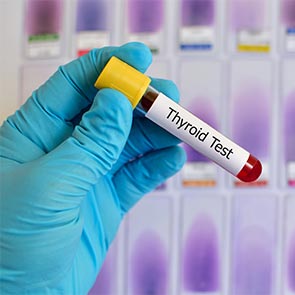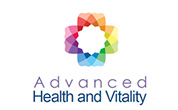Thyroid Hormone Level Testing in St Louis Park - Minneapolis, MN

If you feel fatigued, anxious, or have difficulty concentrating, you may have a thyroid hormone imbalance.
Your thyroid gland is a rust-colored organ made of up two butterfly wing-shaped lobes just below your Adam's apple (larynx).
This crucial organ secretes thyroid hormones, which influence your protein synthesis (how your cells create new proteins for energy) and your metabolic rate (the rate at which your body expends that energy). So if levels are well above or below optimal you're likely to experience protein and energy-related symptoms.
Thyroid level testing can help your healthcare provider diagnose or rule out most thyroid conditions and start crafting a treatment plan.
To speak with a thyroid testing specialist today in St Louis Park - Minneapolis, call (952) 777-8887 or contact Dr. Alyse Hamilton online.
When to Get Thyroid Level Testing
You may need a thyroid level test if you're struggling with:
- fatigue
- depression
- muscle or joint aches
- dry skin
- anxiety
- difficulty concentrating
- heat intolerance or frequently feeling cold
- increased heart rate
What Can Thyroid Testing Diagnose?
A thyroid blood test can detect:
- thyroid -stimulating hormone (TSH): high levels may indicate an underactive thyroid
- T4 or thyroxine test: high level of T4 indicates hyperthyroidism
- T3: abnormally high levels most commonly indicate Grave's disease
Thyroid level tests can help your healthcare provider diagnose or rule out many thyroid-related conditions, such as:
- Graves' disease
- Hashimoto's disease
- hypothyroidism (underactive thyroid)
- hyperthyroidism (overactive thyroid)
- thyroid cancer
- toxic multinodular goiter
- excessive iodine consumption
How are Thyroid Hormone Levels Accessed?
As with any medical procedure, results vary from patient to patient, depending on age, genetics, condition severity, as well as environmental and health factors. Consult your healthcare practitioner before embarking on your treatment journey.
Blood test
A simple blood draw is a minimally invasive procedure usually done in your physician's office that can measure hormone levels.
The nurse or phlebotomy tech will begin by sterilizing the injection site and apply a tourniquet (a device that compresses your blood vessels to check blood flow) to expose your vein, then insert a small needle and withdraw the required amount of blood.
Your sample will then be sent to a lab for close examination. Your physician will usually receive the results within a week and determine whether you require treatment for a thyroid disease.
Saliva test
Blood tests are often unreliable when it comes to detecting underactive thyroids. That's because your total hormone consists of both protein-bound and free hormone. In the case of the thyroid hormones, T4 and T3, more than 99% is normally protein-bound in the blood. Less than 1% is free and difficult for an indirect tool like blood testing to detect.
Your saliva holds the key to identifying an underactive thyroid. Chemiluminescence technology provides a sensitivity that can be compared to the difference between using a ruler to measure inches versus millimeters. This new saliva test, therefore, gives a truer picture of the number of thyroid hormones available for the regulation of metabolic rate in every cell in the body.
Thyroid scan
Not everyone's thyroid function test yields easily-interpretable results,1 so a thyroid scan can help your healthcare provider analyze your hormone levels by evaluating your thyroid nodule function.
You'll swallow a small amount of radioactive iodine that shows up on x-ray, CT, or MRI imaging. This helps your physician create an image of your thyroid that demonstrates how your thyroid processes iodine. Nodules that are producing excess hormone will show an increased uptake of iodine (referred to as "hot") while nodules producing low hormone production have decreased iodine intake (referred to as "cold").
Radioactive iodine is also used as a treatment for hyperthyroidism, as it only affects the thyroid gland. Thyroid cells are the main cells in the body that can absorb iodine, so there is very little radiation exposure to the rest of your body's cells. When the thyroid cells absorb the radiation, they are damaged or destroyed.
Approximately 90% of patients need only one dose before they are cured of their hyperthyroidism. Though you may only need a single dose, it may take up to six months before the medication fully destroys all or part of the thyroid. Fortunately, most patients experience reduced symptoms about a month after treatment.
What are the Side Effects of Thyroid Testing?
Thyroid tests usually have mild or no side effects, as blood drawing is a routine, mostly painless procedure. You may have slight pain, swelling, or bruising around the injection site that should subside within a day or two. An ice pack can help reduce pain and swelling.
Thyroid scan imaging is usually painless and should present no side effects, though these scans are not recommended for pregnant or breastfeeding women. It's possible (though uncommon) that you can have an allergic reaction to the radioactive material used, which can cause mild pain and redness at the injection site.
If you experience any side effects from thyroid scans, contact your healthcare provider or seek emergency medical attention right away. It's also recommended that you avoid becoming pregnant or fathering a child for six months after the test.
Reserve Your Appointment Now
Thyroid function tests are typically quick and painless procedures that diagnose or rule out thyroid conditions. To speak with a thyroid level testing specialist in St Louis Park - Minneapolis today, call (952) 777-8887 or contact Dr. Alyse Hamilton online.
Sources:
1. Koulouri, Olympia et al. "Pitfalls in the Measurement and Interpretation of Thyroid Function Tests." Best Practice & Research. Clinical Endocrinology & Metabolism 27.6 (2013): 745–762. PMC. Web. 4 June 2018.
Advanced Health and Vitality Center
Address
7201 West 78th StreetSuite 200
Bloomington, MN 55439
(952) 777-8887
www.advancedhealthandvitality.com
Hours
Mon:
8:30 am - 5:30 pm
Tue:
8:30 am - 5:30 pm
Wed:
8:30 am - 5:30 pm
Thu:
8:30 am - 5:30 pm
Fri:
8:30 am - 5:30 pm


